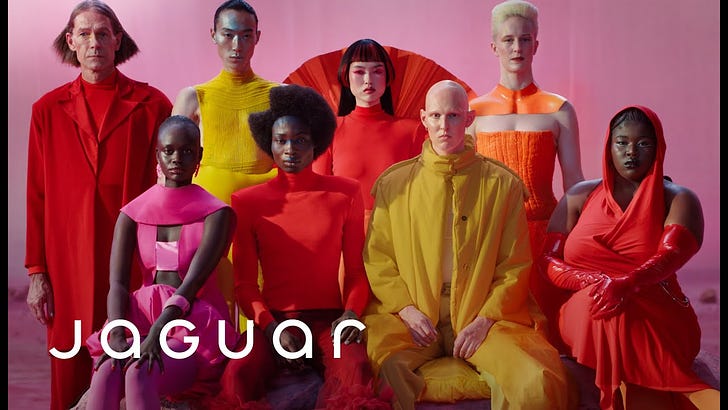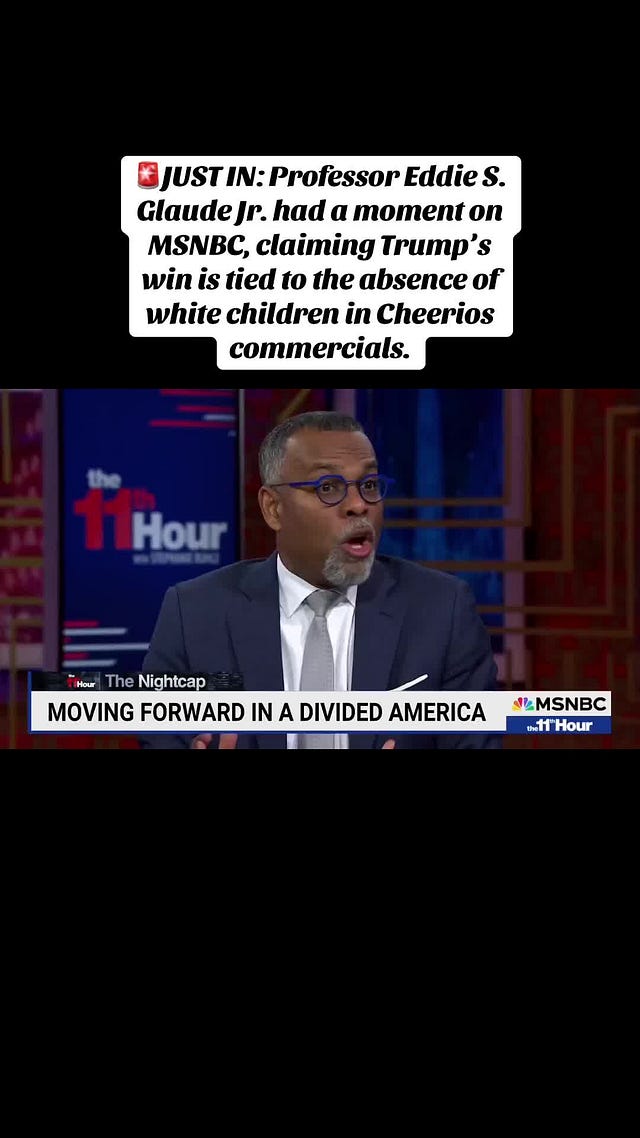When I was in London last week, a friend pulled up the new Jaguar ad that had been going around the internet over the previous month. I hadn’t gotten around to watching it. But as someone who doesn’t care about cars but does care about mass media, I had heard more about the shoddy rebrand than the ad itself so I was mostly expecting a new font or that they had gotten rid of the leaping pewter jungle cat or something. You know, something English people would lose their shit about.
I won’t spend too much time talking about the details of a 30-second ad spot but you should know that the commercial fails on every level with which it desired to engage. And that’s true for even the most basic goal (I would think) which is to sell cars to upper middle class people. There aren’t any cars in the commercial! My friend and I asked the other people at the dinner table what they thought it would be an ad for if they went in without context and the answers were a printer, a paint company, and a new Samsung TV.
The preview image itself could be the basis for a dissertation on modern liberal aesthetics. It’s self-consciously inclusive, which is honestly fine! It’s an abstract ad—a bad one mind you—but the people who complain about woke/DEI shit are especially annoying here because, what, the nonsensical future Starbust ass palette world is too diverse? What is the internal logic of this world even supposed to be?! So that’s the first gear which is basically whatever, people getting mad that there are black elves or Asian superheroes. It’s all very stupid.
What isn’t stupid is what this represents to ostensible progressive types who have somehow been convinced that this ad represents some sort of forward locomotion in the pursuit of equality and inclusion. That is, of course, not a new observation, and has been one of the critiques of corporate DEI initiatives for the last few years. “It seems as if some of the left is focusing on rarified realms of hypersensitivity when the house is burning down,” Robert Kuttner wrote in The American Prospect last October, using Cory Booker’s desire for a diverse set of lawyers and bankers in the Albertsonss-Kroger merger. It’s the “hire more female guards at Guantanamo” joke but for inflation.
There are small things and big things colliding here. The decision to focus on terminology (the endless demographic acronyms, ditching words like ‘master bedroom’) rather than the entrenched system that created all this shit in the first place was both the preferred outcome by powerful interests and the only one they would let move into popular consciousness. So people took what they could get, and it ended up being a poor, but expedient, replacement for actual change that didn’t end up changing much. But it’s a lot harder to rip something out root and branch than it is to prune petals.
Ok so that potted analysis probably isn’t unfamiliar, but I was reminded of it reading this excellent essay Nesrine Malik wrote about how Democratic party elites are already trying to abandon progressive politics because they think “wokism” lost the election. (It didn’t lol.) Pieces of media like that Jaguar ad—or even Princeton professor Eddie Glaude’s inane suggestion that Trump won because people were turned off by “racially ambiguous children in Cheerios commercials”—serve dual purposes by allowing corporations to say ‘hey we’re trying!’ while doing absolutely nothing. That isn’t much different than the history of corporate activism, but what is slightly more sinister this time is that these endeavors have time bombs strapped to them. By pursuing equality-through-advertising and, then, subsequently being able to blame it for political losses, powerful interests win the same game twice. In her essay, Malik talks about why that’s such a beneficial outcome for a lot of people who want things to remain exactly as they are:
One reason is that it offers a simple culprit – and a mistake easy to avoid next time. It’s far more straightforward to blame an abstract “wokeness” than to reckon with the fact that Harris ran a broadly right-of-centre campaign and still lost. It also conjures up a convenient voter, one who is more offended by language than by the promise of mass deportations. That then makes these voters retrievable rather than subject to big shifts, both of class dealignment and the transformation of parties formerly supported by the working classes into ones that attract higher-income voters.
It’s almost as if the elite capture of ostensibly progressive political aesthetics was done on purpose or, put in a less theoretical/pretentious way, it’s almost as if the Ford Foundation or the Carlyle Group supporting a cause means that the cause in question isn’t actually threatening anything structural. But those conspiratorial ends require some useful idiots, which brings us back to the people behind the Jaguar ad who are both bad at their jobs (marketing; branding) and bad at understanding symbols.
The last thing I’ll say is that these ads don’t actually move things one way or another politically. I would guess that some massive majority of voters don’t decide on candidates because they saw a diverse commercial that made them mad. I have heard people earnestly say the ad is “woke nonsense” but I’m just not convinced that’s the political tipping point for people who are, say, struggling to buy groceries or pay their rent. But labeling things like the Jaguar spot as a real political lever that does swing elections is a way of saying “nothing really needs to change.” Just get rid of these woke commercials and things will go back to normal again. You won’t have to deal with Trump or Vance or any other mannerless brutes again. It is an effete vision of politics, the sort of thing you might see in a limited BBC series about Victorian nobility that elides all the nasty bits about class in favor of something simpler.






